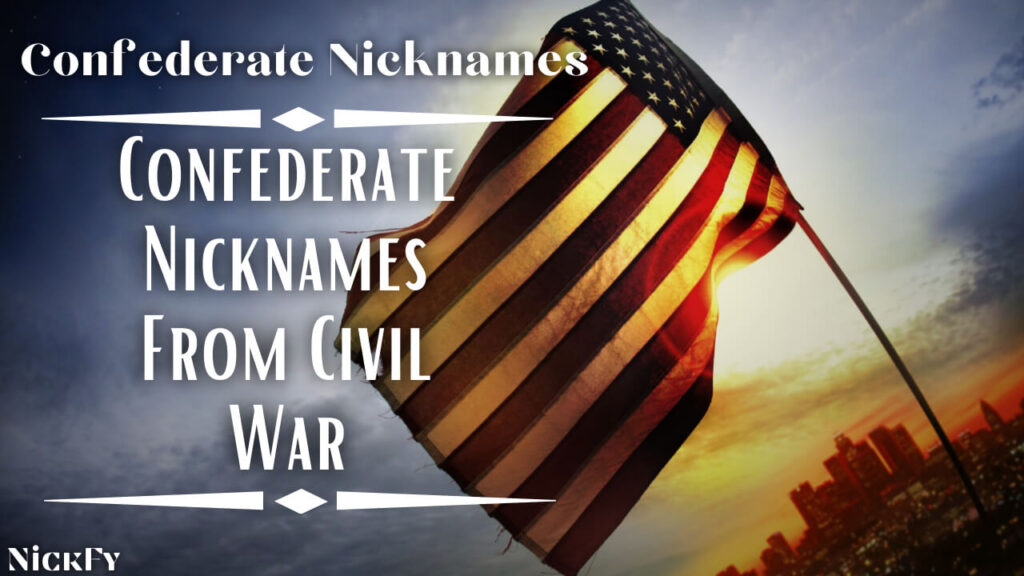Confederate Nicknames | Looking for Confederate nicknames? Don’t worry, In this post, I’m sharing the list of Confederate nicknames from the American Civil War.
The ongoing fascination with the Civil War era stems from its historical significance and its unique characters, not the least of which were given memorable nicknames that helped shape the way history sees them.
In this post, I will uncover the backstory behind these nicknames and their part in the American Civil War narrative.
From legendary generals to courageous soldiers on the front lines, let’s explore a lesser-known aspect of these historical figures that left a lasting impact on American history.
Understanding Confederate Nicknames
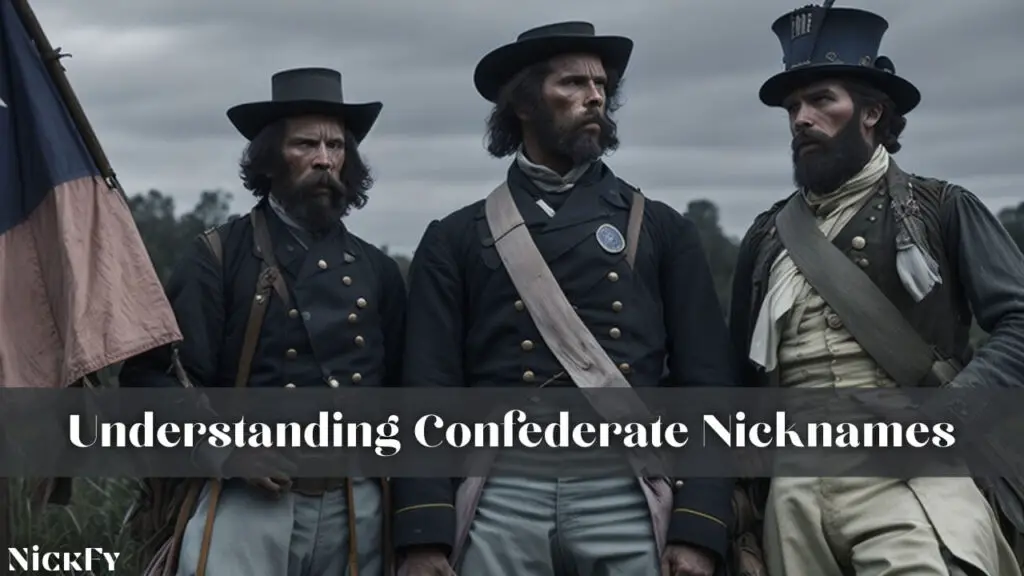
What’s the story behind all these nicknames, you ask? Well, during the Civil War, nicknames often emerged as a way to characterize individuals based on their distinct personality traits, battlefield exploits, or physical attributes.
Exploring these nicknames takes us back in time to the Civil War era when soldiers, generals, and armies were often characterized by unique and sometimes descriptive nicknames.
These Confederate nicknames often reflected their courage, characteristics, battle strategies, or exploits on the battlefield.
A deeper understanding of these nicknames doesn’t just illuminate the personas of the people in this historical period but also brings to life the dramatic circumstances in which these names were often coined.
The Legacy And Controversy Of Confederate Nicknames
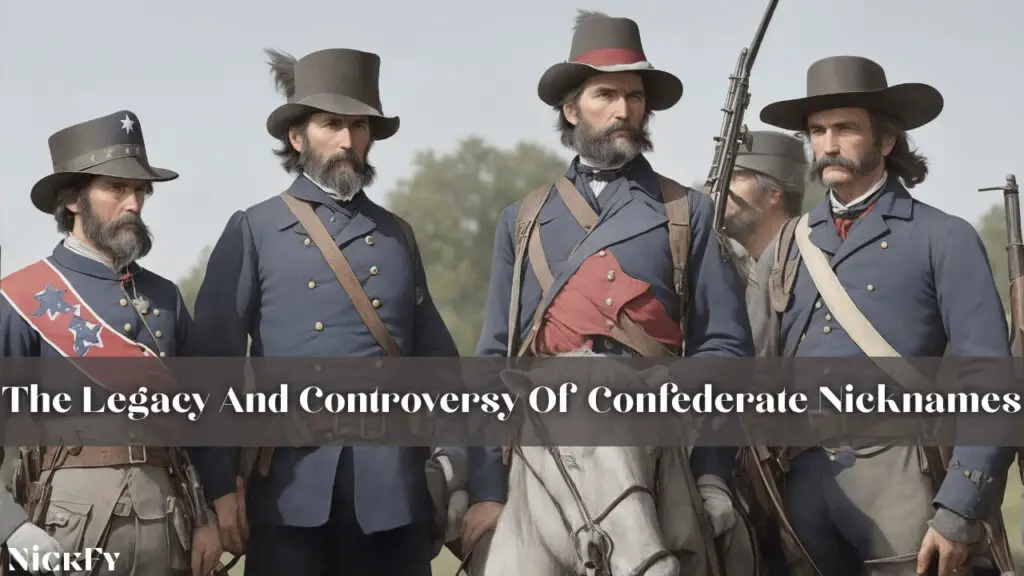
As with any aspect of history, Confederate nicknames come with their share of legacy and controversy.
While some are revered for their heroism and leadership, others are controversial reminders of a divisive past.
These nicknames offer insights into the mindset and values of the era, and it’s important to consider the context in which they were given as we attempt to understand the complex reality of the Civil War.
Confederate Generals Nicknames
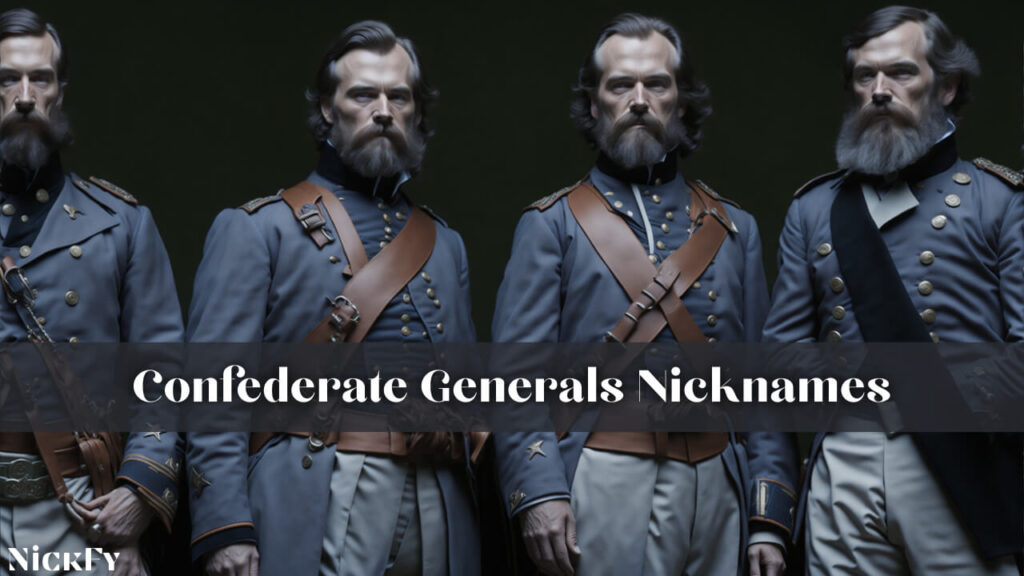
Looking for Confederate Generals from the Civil War? No worries, In this section, I’ve compiled a list of nicknames for these celebrated Confederate generals.
Confederate generals hold paramount acclaim in the annals of the Civil War history. Often known by their nicknames as much as by their real names, these figures were the driving force of the Confederate military.
From Robert E. “Granny” Lee, the fatherly figure of his men, to the steadfast Thomas “Stonewall” Jackson, I’ll dive into the stories that cocooned into the formation of their vivid nicknames.
Below, you’ll find an intriguing compilation of nicknames belonging to Confederate Generals. Brace yourself, ’cause we’re about to flip back in time.
- Robert E. “Granny” Lee – Caring and nurturing like a Granny, General Robert E. Lee was referred to by this nickname due to his fatherly demeanor.
- Thomas “Stonewall” Jackson – Known for standing tall and firm like a stone wall on the battlefield, hence the nickname.
- Braxton “Bull” Bragg – Known for his stubbornness and his fierce fighting style, much like a bull, hence the nickname.
- James “Old Pete” Longstreet – Reportedly, James Longstreet was called “Old Pete” due to his slow and steady approach.
- Joseph “Fighting Joe” Johnston – Known for his combative spirit and courage, thus earning the nickname “Fighting Joe”.
- John “Tiger John” McCausland – Known for his ferocity in battle, thus the nickname “Tiger John”.
- George “Little Powell” Hill – He was referred to as “Little Powell” because of his small stature.
- Patrick “Old Reliable” Cleburne – Known for his reputable leadership and consistent strategies, hence the nickname.
- Sterling “Old Pap” Price – He was well-regarded as a fatherly figure by his troops, so they called him “Old Pap”.
- Richard “Dick” Ewell – “Dick” is a common short form for the name Richard.
- Pierre “Little Frenchman” Beauregard – Due to his French heritage and slight stature, he was given the nickname “Little Frenchman”.
- John “Sam” Hood – Often called “Sam” by his friends and soldiers due to his last name Hood, as it sounds like “Sam Hood” which is a popular cloth material.
- Jubal “Old Jube” Early – Called “Old Jube” because of his first name, Jubal, and his age.
- Albert “Old Straight” Johnston – He earned the nickname for his honesty and straightforward nature.
- William “Extra Billy” Smith – Smith received this nickname due to his propensity for creating additional (or “extra”) business opportunities.
- Isaac “Old Mudwall” Trimble – Known for his tough and yet crude style of warfare, like a mud wall.
- Simon “Bolivar” Buckner – Named after the South American political leader in recognition of his strong leadership abilities.
- Robert “Prince John” Magruder – Known for his theatrical and flamboyant style, hence was given assigned the nickname.
- William “Bloody Bill” Anderson – Anglicized form of the Scandinavian given name “Anders”.
- Roger “Ramrod” Pryor – He was referred to as “Ramrod” due to his firm disposition.
- Raphal “King of Spades” Semmes – Because he made his men dig trenches often, he was called the “King of Spades”.
Confederate Soldiers Nicknames
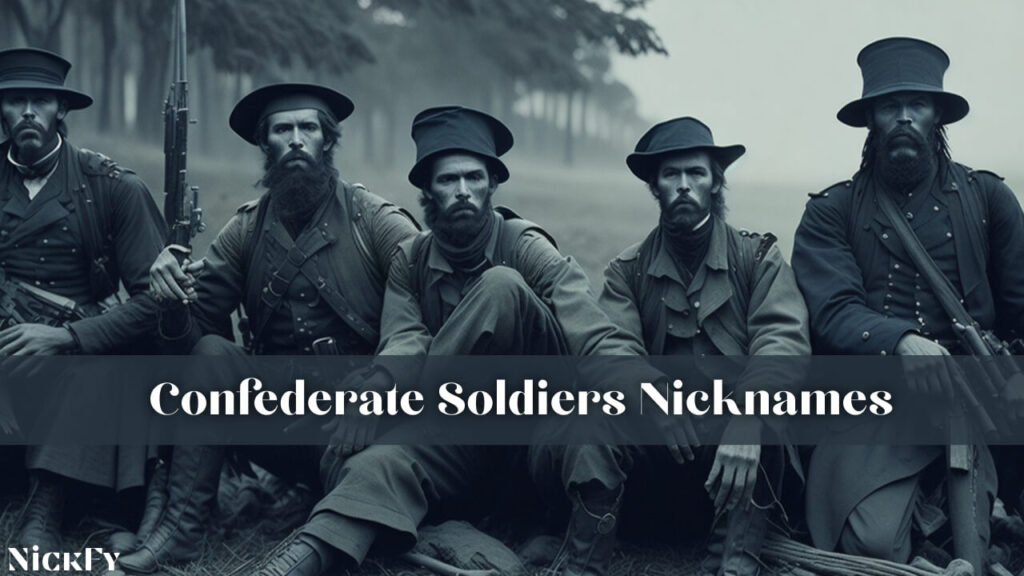
Don’t know Confederate soldiers’ nicknames? Calm down, In this segment, I’ve shared my collection of nicknames for those brave Confederate soldiers.
Beyond the highest ranks in the Confederate army, soldiers too were often given nicknames reflecting their courage, origin, and deeds.
‘Johnny Reb’ became a general term for Confederate soldiers much like ‘Billy Yank’ was used for Union soldiers.
Other nicknames were directly coined for individual soldiers like ‘Extra Billy’ Smith, known for his extra mileage claims, and William ‘Bloody Bill’ Anderson, a feared guerilla leader.
Here’s the list of Confederate soldier nicknames that will help you.
- Johnny Reb – A generic nickname used for Confederate soldiers representing an ordinary Southern soldier.
- Grey Ghost – The nickname given to soldiers in recognition of their elusive tactics and grey uniforms.
- Butternut – This nickname comes from the butternut dye used to color the uniforms of many Confederate soldiers.
- Colonel Dahlgren – The moniker of the commander of the disastrous Dahlgren’s Raid in 1864.
- High Private – This was a humor-infused nickname for soldiers who were self-mocking in the face of rank disparity.
- Rebel Yell – This nickname was common among Confederate soldiers known for their fierce and intimidating yell on the battlefield.
- Secesh – Short for “secessionist”, it was occasionally used to refer to Confederate soldiers.
- Tar Heel – Originated from the sticky tar on their heels from North Carolina’s pine forests, it was used for North Carolina soldiers.
- Fire-Eater – A nickname used for pro-slavery militants and secessionists before and during the Civil War.
- Quantrill’s Raiders – Named after their flamboyant leader, William Clarke Quantrill, these soldiers were particularly notorious.
- Shelby’s Iron Brigade – Soldiers serving under the command of General Joseph O. Shelby earned this nickname due to their ferocious engagements.
- Bushwhackers – This name was used for Confederate irregulars who used guerrilla warfare techniques.
- Morgan’s Raiders – Named after their commander, John Hunt Morgan, they conducted swift cavalry raids on Union forces.
- Virginia Tiger – Soldiers from Virginia who were ferociously loyal to the Confederate cause were called Virginia Tigers.
- Louisiana Tiger – A nickname for infantry soldiers from Louisiana known for their unique Zouave-style uniform and their brave, sometimes reckless bravery.
- Bragg’s Braggarts – Soldiers under General Braxton Bragg were sometimes called “Bragg’s Braggarts” in sardonic humor, referring to the General’s notorious unpopularity.
- VMI Cadets – Soldiers from the Virginia Military Institute who fought in the battle of New Market, these cadets were young but fierce fighters.
- Mosby’s Rangers – Another group of guerrilla soldiers who fought under John M. Mosby, earning themselves the nickname.
- The Orphan Brigade – A unit of the Confederate army composed mainly of Kentuckians who were ‘orphaned’ from their Union-held home state.
- The Louisiana Brigade – Confederate soldiers hailing from Louisiana were often collectively referred to by this name.
- Bordeaux Boys – Confederate soldiers who were known for their appreciation and consumption of red wine.
FAQs About Confederate Nicknames
In this section, I’m answering some of your most-asked questions about Confederate nicknames.
What were the nicknames for the Union and Confederate Soldiers?
The nicknames for the Union soldiers were “blue coats” and “Yankees.” The nicknames for the Confederate soldiers were “Grey Coats” and “Rebels.”
What were Confederate nicknames?
Confederate nicknames were informal and catchy monikers given to Confederate soldiers and generals during the American Civil War. These names reflected their personality, fighting style, or certain attributes.
Why were nicknames so popular among Confederate soldiers?
Nicknames helped create camaraderie and boosted morale among troops. They often lightened the atmosphere, injecting a sense of kinship and high spirits despite the harsh realities of war.
What’s the origin of the nickname “Johnny Reb”?
“Johnny Reb” represents the ordinary Southern Confederate soldier. The term combines the name “Johnny”, which was common at the time, and “Reb”, short for “rebel”.
Why was Thomas Jackson nicknamed “Stonewall”?
Thomas Jackson earned the nickname “Stonewall” after standing tall and firm like a stone wall on the battlefield. His unwavering resolve made his nickname a symbol of steadfastness.
How did the term “Grey backs” come about?
“Grey backs” was a nickname given to Confederate soldiers due to their Grey uniforms. The term represents the soldiers’ appearance and serves as a visual reminder of their participation in the war.
What does “Tar Heels” mean, and why was it used for North Carolina soldiers?
“Tar Heels” was a nickname for North Carolina soldiers, originating from the state’s pine forests and the sticky tar residue found on their heels. The name symbolizes their regional identity and connection to the natural resources of their state.
How did James Longstreet get the nickname “Old Pete”?
James Longstreet earned the nickname “Old Pete” because of his slow, steady, and methodical approach to war. The name likely reflected the respect people had for his calculated tactics and steadfast demeanor.
What is the story behind General Robert E. Lee being called “Granny”?
General Robert E. Lee was regarded as a fatherly figure to his troops and cared for their needs. This nurturing demeanor earned him the nickname “Granny,” reflecting his gentle and caring side.
What were the “Louisiana Tigers” known for?
The “Louisiana Tigers” were Confederate soldiers from Louisiana known for their unique Zouave-style uniforms and exceptional fighting abilities. They were fierce, brave, and often engaged in reckless acts of bravery.
What does “Secesh” mean?
“Secesh” is short for “secessionist”, a term used for those supporting or advocating the secession of Southern states from the Union.
Confederate soldiers were sometimes referred to as “Secesh” due to their support of secession and the Confederate cause.
Conclusion
So there you have it! The list of Confederate nicknames has come to a close, and I hope you’ve explored these intriguing stories with me.
Understanding the intention and implication behind these Confederate nicknames provides us with a deeper understanding of the American Civil War.
It gives identity to the men involved, who they were, what they achieved, and how they etched their names into history.
Controversial as they can turn out to be, these nicknames are undoubtedly an integral part of exploring our past as a nation.
Through the study and interpretation of these names, we can bridge the gap between history and interpretation, leading us toward a more insightful perspective on the American narrative.
If you like this post, please share it with your friends and family on social media. If you have any suggestions, feel free to leave a comment. Thank you and peace.

